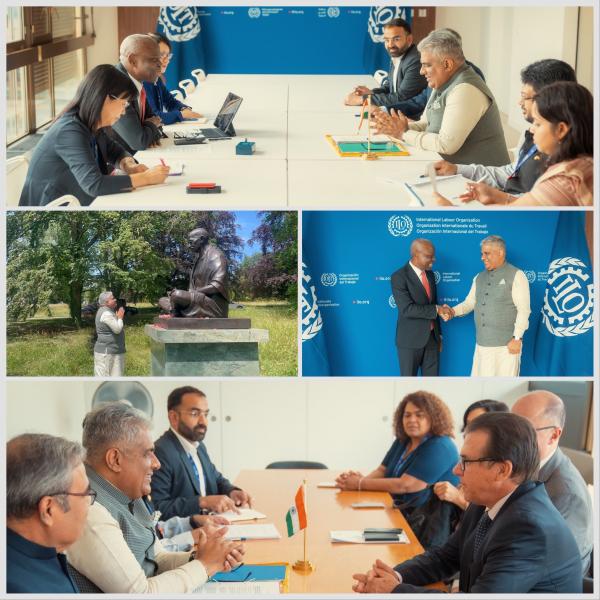
International Labour Conference Diary: Aligning G20 priority areas with ILO agenda
13/06/2023
BLOG
I landed in Geneva, Switzerland today to participate in the 111th International Labour Conference of the International Labour Organisation (ILO).
Created in 1919, as part of the Treaty of Versailles, which brought World War I to an end, ILO is the only tripartite United Nations agency which brings together governments, employers and workers of 187 Member States. Through these 187 countries, the ILO reflects the belief that lasting peace can be accomplished only if it is based on social justice.
With that understanding, ILO’s Philadelphia Declaration, 1944, stating, “poverty anywhere is a threat to prosperity everywhere” was declared as the main objective for protecting the rights and the dignity of humans.
Over the years, ILO has worked towards safeguarding the interests of workers world over.
ILO has played a role at key historical junctures – the Great Depression, decolonization, the end of apartheid in South Africa – in terms of outlining and protecting the rights of workers. Today, ILO is engaged in ensuring the building of an ethical and productive framework for fair globalization by engaging the member countries and ensuring accountability.The organisation has worked towards building institutional capacities and strengthening capacities of member countries.
India’s association with ILO is now over a century old, datingback to 1922. While India became a permanent member of the ILO Governing Body since in 1922, the first ILO Office in India started in 1928.
It is therefore a proud moment for me to be in Geneva for the second time to attend ILO’s Labour Conference.
I thus began my visit by paying homage to the statue of Mahatma Gandhi at Ariana Park in Geneva. The statue was unveiled on November 14, 2007, to commemorate the 60th anniversary of Indo-Swiss friendship. Geneva’s significance in furthering peace, harmony and friendship is all too well known. It was here that several treaties aimed at fostering peace after World War II were signed. Mahatma Gandhi’s statue was therefore a fitting gift from the Indian government to the city of Geneva, a place that stands for peace.
Over the course of my five-day engagements at the International Labour Organisation, I will be will be sharing India’s experiences in labour reforms and ensuring social security. Over the last nine years, led by Hon’ble PM Shri Narendra Modi ji, India has made great strides in furthering social security both for organised and unorganised workers. I also look forward to work towards PM Modi’s vision of greater global cooperation for migrant and expatriate workers.
The 111th International Labour Conference is happening at a time when India has assumed the G20 Presidency. During India’s Presidency, the G20 Employment Working Group (EWG) is discussing three important priority areas:
The world of works is rapidly changing because of factors such as of digitalization, demographic changes, and the green transition. These factors have been further amplified by the Covid pandemic. These factors together are acting as the barriers to labour market inclusion and underutilisation of people’s capacities, thereby holding back economic growth and productivity.
Addressing global skill gaps holds significant relevance in the Indian context. India has a sizable and young population. This presents a demographic dividend and realising the full potential of this advantage requires equipping the workforce with essential skills in demand in the global economy.
Achieving a “just” transition towards environmentally sustainable economies and societies for all in response to climate and technological changes is essential to ensuring that workers and communities are not left behind. Many traditional sectors are becoming obsolete and workers in such sectors are at the risk of losing their livelihood. At the same time, new jobs are emerging in renewable sectors. Therefore, India believes that there is a need to take affirmative action, both at the country as well as global level to promote just transitions through promotion of skilling, up-skilling and reskilling, social protection and social dialogue to achieve this goal.
The Indian G20 Presidency recognises the need to identify existing and anticipated skill gaps and ensure comparability of national skills and qualifications frameworks as essential solutions to effectively bridge these gaps.
A NITI Aayog report has estimated that the number of workers engaged in the gig economy in India would increase to 23.5 million by 2029-30. With the gig economy workforce on the rise, and in alignment with India's commitment to Sustainable Development Goal (SDG) 1.3, which aims to implement appropriate social protection systems and measures for all by 2030, the EWG aims to continue the discussions initiated during the Saudi Arabian presidency.
Ensuring sustainable financing for adequate social protection is a priority highlighted by the Indian Presidency.
Additionally, India’s emphasis on sustainable finance of social protection aligns with the priorities of the Universal Social Protection 2030 agenda. The G20 can collaborate to develop innovative models that address both financial sustainability and the progressive universality of social protection frameworks, especially for emerging, developing, and underdeveloped economies worldwide.
The Indian Presidency has laid emphasis on knowledge sharing and the exchange of ideas pertaining to the three key priority areas. G20 countries have endorsed the importance of these priority areas set forth by the Indian Presidency.
On the sidelines of the Conference today, I met with ILODirector General Mr Gilbert Houngbo.
We discussed issues around EWG Priority Areas of Global Skill Gaps, Gig and Platform Economy and Social Protection and Sustainable Financing for Social Security under India’s G20 Presidency.
I also met Minister of Labour and Employment of Brazil Luiz Marinho and we spoke about ways in which we can further our cooperation in a way that benefits workers in both countries creating newer opportunities in a changing work environment.
I look forward to engaging with ILO Member Nations during my stay in Geneva on these and other key issues that have the potential to impact the lives and livelihoods of our working population.
